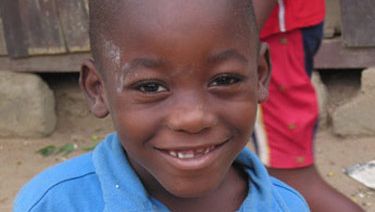Buduburam Bound
Small, brightly painted mud-brick houses sag with fatigue under the afternoon sun in Buduburam, a Liberian refugee camp in Ghana.

Small, brightly painted mud-brick houses sag with fatigue under the afternoon sun in Buduburam, a Liberian refugee camp in Ghana. The stench of waste is overwhelming until a light breeze brings a whiff of humid air. Friendly young women lift their heads from their wash tubs, waving while keeping their other hand in the suds. Occasionally a girl of no more than sixteen will stop and talk to her neighbor with her baby tied to her back. The vibrant cloth strapped tightly across the mother's breasts keeps the baby comfortably wrapped behind them piggy-back style. Babies round heads bob as she sets off on her next errand. The rhythmic crunch of the dirt beneath her feet makes her babies eyelids flutter closed.
Shop owners lean back in their chairs sleepily as they listen to a battery-powered radio. A man sleeps inside the darkness of his pastry shop as his two sons play in front, their foreheads shining from perspiration. Although the sun is hot and few trees shade the refugee camp, kids are everywhere. Young children of all ages dressed in hand-me-down clothes amuse each other with clapping games or tag. But some children are busy selling water or helping with household chores. Some lucky kids sit packed in a brick schoolhouse paying anywhere from the $10-50 U.S. dollars a semester.
So far, the most overwhelming poverty I've seen is in the camp even though conditions of their homes seem better than some of the roadside tenements I saw on the way to Kumasi. I say this because I am spending more time with the refugees, learning about how much it costs to go to school, how hard it is to earn a living (some girls as young as 13 prostitute themselves for food), and what it's like inside their homes and offices. I've gotten a close look at their lives and what it takes for them to survive here — a place that is better than Liberia.
The more time I spend with them, the more I get to see how proud Liberians are as a people and how hard it is for them to reveal their struggle. One man told me that their pride derives from their American ancestors who settled in Liberia long ago. Some people think there is a special way or passage to get to America from Liberia. And most believe in their American-ness, trusting in the strength and perseverance of their ancestors even though very few Americans are even aware of our connection to Liberia.
Get exclusive access to fashion and beauty trends, hot-off-the-press celebrity news, and more.